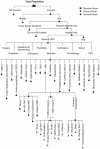The cost of universal health care in India: a model based estimate
- PMID: 22299038
- PMCID: PMC3267714
- DOI: 10.1371/journal.pone.0030362
The cost of universal health care in India: a model based estimate
Abstract
Introduction: As high out-of-pocket healthcare expenses pose heavy financial burden on the families, Government of India is considering a variety of financing and delivery options to universalize health care services. Hence, an estimate of the cost of delivering universal health care services is needed.
Methods: We developed a model to estimate recurrent and annual costs for providing health services through a mix of public and private providers in Chandigarh located in northern India. Necessary health services required to deliver good quality care were defined by the Indian Public Health Standards. National Sample Survey data was utilized to estimate disease burden. In addition, morbidity and treatment data was collected from two secondary and two tertiary care hospitals. The unit cost of treatment was estimated from the published literature. For diseases where data on treatment cost was not available, we collected data on standard treatment protocols and cost of care from local health providers.
Results: We estimate that the cost of universal health care delivery through the existing mix of public and private health institutions would be INR 1713 (USD 38, 95%CI USD 18-73) per person per annum in India. This cost would be 24% higher, if branded drugs are used. Extrapolation of these costs to entire country indicates that Indian government needs to spend 3.8% (2.1%-6.8%) of the GDP for universalizing health care services.
Conclusion: The cost of universal health care delivered through a combination of public and private providers is estimated to be INR 1713 per capita per year in India. Important issues such as delivery strategy for ensuring quality, reducing inequities in access, and managing the growth of health care demand need be explored.
Conflict of interest statement
Figures
References
-
- Moody A. Moody's pegs India's economic growth at 7.5–8% in FY12. 2011. Economic Times. New York.
-
- UNDP. Human Development Report 2010. New York: United Nations Development Fund; 2011.
-
- Suryanarayana M, Agrawal A, Prabhu K. Inequality adjusted Human Development Index for India's States 2011. New Delhi: United Nations Devlopment Fund; 2011.
-
- Baru M, Acharya A, Acharya S, Shiva Kumar A, Nagraj K. Inequities in Access to Health Services in India: Caste, Class and Region. Economic and Political Weekly. 2010;XLV:49–58.
Publication types
MeSH terms
LinkOut - more resources
Full Text Sources
Research Materials



